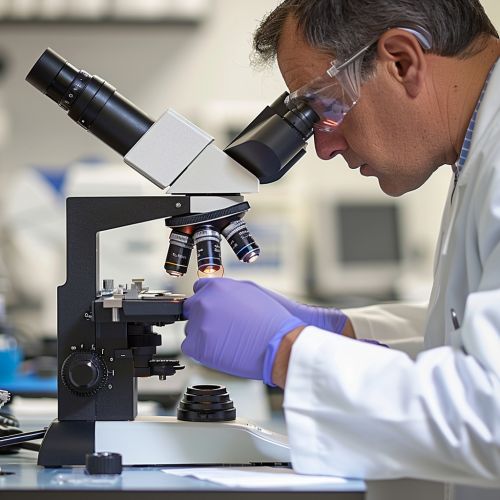Pathologist
Overview
A pathologist is a medical professional who studies the causes and effects of diseases. They play a crucial role in patient care by providing vital information that helps guide diagnosis and treatment decisions. Pathologists often work behind the scenes in laboratories, examining samples of body tissues, fluids, and in some cases, entire organs, to identify abnormalities.
Role and Responsibilities
Pathologists are responsible for a wide range of tasks, including conducting autopsies, performing laboratory tests, and interpreting the results. They work closely with other medical professionals, such as surgeons and oncologists, to provide accurate diagnoses and determine the most effective treatment options for patients.
Specializations
Pathologists can specialize in a variety of areas, including:
Anatomic Pathology
Anatomic pathologists examine organs, tissues, and cells to identify diseases. They often work in hospitals or laboratories, where they perform autopsies and examine surgical specimens to determine the cause of death or disease.
Clinical Pathology
Clinical pathologists specialize in laboratory medicine. They oversee testing of body fluids and tissues, interpret the results, and provide consultation to other physicians.
Forensic Pathology
Forensic pathologists apply principles of pathology to legal matters. They perform autopsies to determine the cause and manner of death in cases where it is sudden, unexpected, or involves legal issues.
Molecular Pathology
Molecular pathologists study diseases at the molecular level, using advanced techniques to detect abnormalities in genes and proteins that may be indicative of disease.
Education and Training
Becoming a pathologist requires extensive education and training. After obtaining a bachelor's degree, aspiring pathologists must attend medical school to earn a Doctor of Medicine (MD) or Doctor of Osteopathic Medicine (DO) degree. Following medical school, they must complete a residency in pathology, which typically lasts three to four years. Some pathologists choose to further specialize by completing a fellowship in a specific area of pathology.
Challenges and Ethical Considerations
Pathologists face a variety of challenges in their work, including the need for continuous learning due to the rapid advancement of medical knowledge and technology. They must also navigate complex ethical issues, such as maintaining patient confidentiality and dealing with sensitive information.
Impact on Patient Care
Although they often work behind the scenes, pathologists play a vital role in patient care. Their expertise helps guide diagnosis and treatment decisions, contributing to improved patient outcomes.
Future Directions
The field of pathology is continually evolving, with advances in technology and molecular biology offering new ways to diagnose and treat diseases. Future directions in pathology may include the increased use of artificial intelligence and machine learning in diagnostic processes, as well as the development of personalized medicine approaches based on genetic information.


